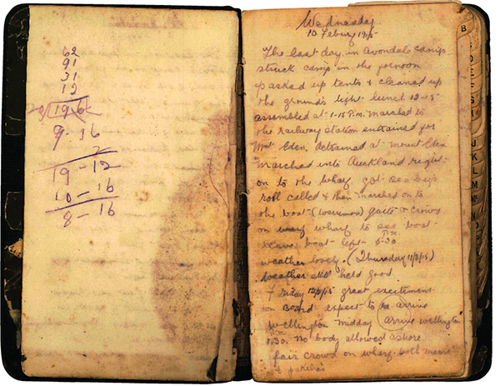A hell of a time
Joseph (Hohepa) Teihoka
Hohepa Teihoka was born in Kaiapoi in 1886, the son of Mere (Mary) Elizabeth Hopa and Taare Wi Teihoka, Rangatira of Kaiapoi. Although Hohepa spent most of his life at Taumutu, near Lake Ellesmere, his granddaughter, Francis Diver, reflects that his heart was really in Tuahiwi, where all his whānau are buried.
Hohepa enlisted for the New Zealand Expeditionary Force (NZEF) in September 1914, and joined the first Māori contingent to serve in World War One. Hohepa left New Zealand aboard the Warrimoo on 14 February 1915, arriving in the Dardenelles in July 1915. He spent his first day on Turkish soil digging out trenches with shells whizzing overhead. What makes Teihoka’s story so remarkable is that he chose to keep a diary throughout his war service, leaving behind a very accurate and haunting account of his time served in the NZEF.
Eleven days after stepping on foreign soil, Teihoka recorded that the snipers made bathing very uncomfortable, with bullets landing very close to some of the chaps while taking a swim, and that a Private was shot going towards the beach. On the evening of 6 August 1915, and in advance of an offensive, Teihoka wrote in his diary that he expected to leave camp about 9pm and to advance right up to Turkish lines by daylight the following morning. Teihoka’s entry the next day recounts the difficult night shared by the men he fought with side by side.
What makes Teihoka’s story so remarkable is that he chose to keep a diary throughout his war service, leaving behind a very accurate and haunting account of his time served in the NZEF.

Hohepa Teihoka’s diary.
Hell of a time last night, made the advance supports to the Wellington Mounted, left the No.2 post about 10pm. Advanced up the gully, my God it was hot work advancing under a hail of bullets. Queer sensation under fire, advanced for about a mile. Got the order to charge the trenches. Charged them and took them too. Stayed in the trenches until daybreak. War ships and field artillery bombarding all the time. Daylight broke to reveal dead lying all over the roads. New Zealand was still advancing, rifle firing was awful, [and] everybody was mixed up with A and B companies by this morning. Advanced about 2 1⁄2 miles into the Turks territory on the left flank , do believe will be in the trenches all day. Not safe to put one’s head above the parapets for fear of getting a bullet through it.
In 1916, Teihoka contracted paratyphoid and was invalided home, but not before an enforced stay in a Cairo hospital. It was this stay that quite possibly caused his family even greater levels of anxiety. Because he didn’t arrive home with his fellow soldiers, it was believed that he had gone missing and his whānau held a memorial service for him in Sedgemere, South Canterbury. Imagine their relief when they heard from a fellow soldier that he had recently spoken with Teihoka in a hospital in Cairo and that he would be on his way home shortly. One month later he disembarked in Lyttelton.
Not long after returning home from the war, Teihoka married Moana Siermis and together they had five children. One of those children, Ila, inherited his wartime diary as a taonga to be shared with whānau. She recalls it was wrapped in a handkerchief and nestled inside the pages was a picture of his sister and her Aunt Hine. His granddaughter Francis would later copy out the contents of the diary so it would be preserved for posterity, shared with the whānau and his story never forgotten.
Like many young soldiers Teihoka bore the emotional scars of war for the rest of his life. His diary remains as a stark reminder of the horror of life in the trenches. The whānau have gifted this taonga to the Ngāi Tahu Archives to be treasured.
Hohepa’s great granddaughter Cindy Diver, along with John Broughton, turned Teihoka’s diary into a play, ‘Hell and Bullets’, which had its one and only performance at Ngāi Tahu Hui-ā-Iwi in Dunedin in 2015.
For immediate whānau members wishing to have their own copy of the full video, please contact Whakapapa Ngāi Tahu on 0800 KAI TAHU (0800 524 8248).